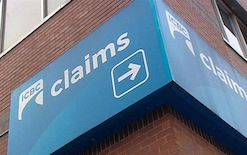Rear end Collisions – Vancouver
ICBC Rear End Collision Claims – Vancouver BC Office
 Our experience: Rear-end collisions
Our experience: Rear-end collisions
In the past 11 years, the majority of our clients have been people involved in rear-end collisions. These clients have chosen to work with us because we are not afraid to take on challenging cases. In some of these cases, ICBC has refused to pay compensation because the damage was only scratched to the bumper. In others, ICBC has tried to blame the victim for stopping too quickly or hitting another vehicle first. Whatever your story is, we can help you get a fair settlement for your rear-end crash. Our record speaks for itself.
If you’ve been involved in a rear-end collision in the Vancouver area, we can help.
(ICBC injury claims lawyers)
Vancouver Rear End Collision Lawyers
Call us today for a free consultation 604-684-4300
*We now have an office in Surrey,
click for information about our Surrey Rear End Collisions Lawyers – ICBC Injury Claims
Whiplash and Rear-end Collisions
The term “whiplash” is associated with injuries to the neck and back that occur in a rear-end collision. This occurs because of the quick jerking motion caused to the neck/upper body when one vehicle strikes another from behind. Whiplash injuries are the most common form of injuries we deal with. These types of injuries are also referred to as “soft tissue injuries”.
Low-Speed Rear-End Collisions – You can still be injured
It is our experience that even low-speed rear-end collisions often cause injury. Our experience is backed up by medical research. Studies have shown that over 90% of car accidents occur at speeds of less than 23 km/hour. The majority of whiplash injuries arise out of this 90%. Other research shows that tire skid marks (which indicate higher speeds) are a poor indicator of injury. In other words, there is not always a link between vehicle speed and the significance of one’s injuries.
Our experienced downtown Vancouver rear-end collision lawyers  take steps to make sure ICBC does not pay you less in a low-speed collision. We use studies and research to make the adjuster understand that, despite low vehicle speeds, your body can (and was) injured by the rear-end collision. We also provide ICBC with a history of our past cases where we took them to court and proved that our clients were injured, even though the vehicles were moving slowly at the time of impact.
take steps to make sure ICBC does not pay you less in a low-speed collision. We use studies and research to make the adjuster understand that, despite low vehicle speeds, your body can (and was) injured by the rear-end collision. We also provide ICBC with a history of our past cases where we took them to court and proved that our clients were injured, even though the vehicles were moving slowly at the time of impact.
Small amounts of vehicle damage can still cause injury
It is our experience that, even when there is minor vehicle damage, whiplash injuries can occur. Even if there are only scratches and scrapes on your bumper, you may still be entitled to money for your injuries. Studies have shown that, in rear-end collisions, the amount of vehicle damage does not indicate whether someone is injured. In other words, one person can have very severe injuries and very little vehicle damage, whereas another may have no injuries from an accident with lots of vehicle damage.
If you’ve been involved in a rear-end collision in Vancouver, and your vehicle had only minor damage, you need the help of an experienced lawyer. Without legal representation, ICBC will try to pay you little or nothing for your injuries. We have settled hundreds of minor vehicle damage claims over the past 11 years. Most importantly, we have obtained large settlements for these car accident victims, despite their vehicles only have minor damage. We use research and records of our past victories to convince ICBC to pay up.
Rear-End Collisions – Rules of the Road
In BC, the law is such that a driver is not permitted to follow too closely behind another. In most cases, if one driver rear-ends another, the driver who did the rear-ending will be found 100% at fault. The law requires all drivers to drive reasonably in the circumstances. As such, if you are driving behind another vehicle, you must take into account things such as weather conditions and traffic flow. If the roads are wet (a common occurrence in the lower mainland) you would be required to keep a greater distance than you would if the roads were dry. Similarly, if the roads were icy, you would be expected to drive below the posted speed limit. Failure to drive reasonably in the circumstances is considered to be “careless driving” and is a breach of section 144 of the BC Motor Vehicle Act.
Braking at intersections – what’s the rule?
Many rear end collisions occur at intersections. This is often because a light turns yellow as one driver is approaching the intersection. There is no hard and fast rule on braking, other than you should, under no circumstances, go through a red light. If the light turns yellow at a time when it would be impossible for you to stop in time, you may be expected to go through the intersection instead of stopping. If you stop in the middle of the intersection, and you are rear-ended, you could be held partially responsible. In a 2010 case, a woman traveling through an intersection slammed on her brakes when a light turned yellow. The woman’s vehicle did not come to a stop until she was in the middle of the intersection. A judge found that she was 75% responsible for the collision because she stopped unsafely in the middle of the intersection.
*Note: there is a new law requiring all vehicles to have winter tires in much of BC. Read article here.
Rear end Collisions involving stopped or broken down vehicles
In some circumstances, a driver that is stopped or broken down on the road can be held responsible if another driver hits their stopped car. This can occur if the driver of the stopped vehicle does not turn on their hazard lights. These emergency lights are meant to warn other drivers if the vehicle is blocking a roadway while stopped.
In the recent BC Court case of Hansen v. Sulyma, the driver of a vehicle ran out of gas while driving at night. He pulled his vehicle over to the side of the road, but did not activate his hazard lights. While the driver was waiting for assistance, another driver struck him from behind. The passenger in the stopped vehicle was seriously injured.
The Court held that the driver of the stopped vehicle was partially liable for the accident. The Court emphasized that he had a legal duty to take steps to keep his passenger safe. In failing to activate his hazard lights, he did not alert other vehicles to his presence, and as such, he failed in his legal duty to keep his passenger safe.
(ICBC injury claims lawyers)
Vancouver Rear End Collision Lawyers
Call us today for a free consultation 604-684-4300

BACK to: Vancouver ICBC Auto Injury Claims homepage
Author:




